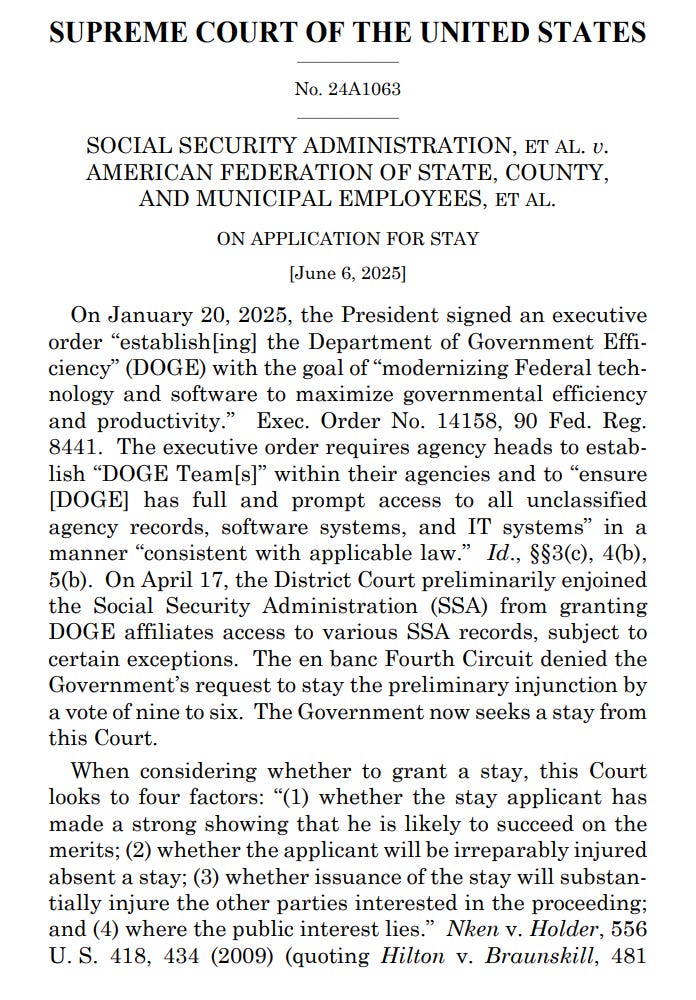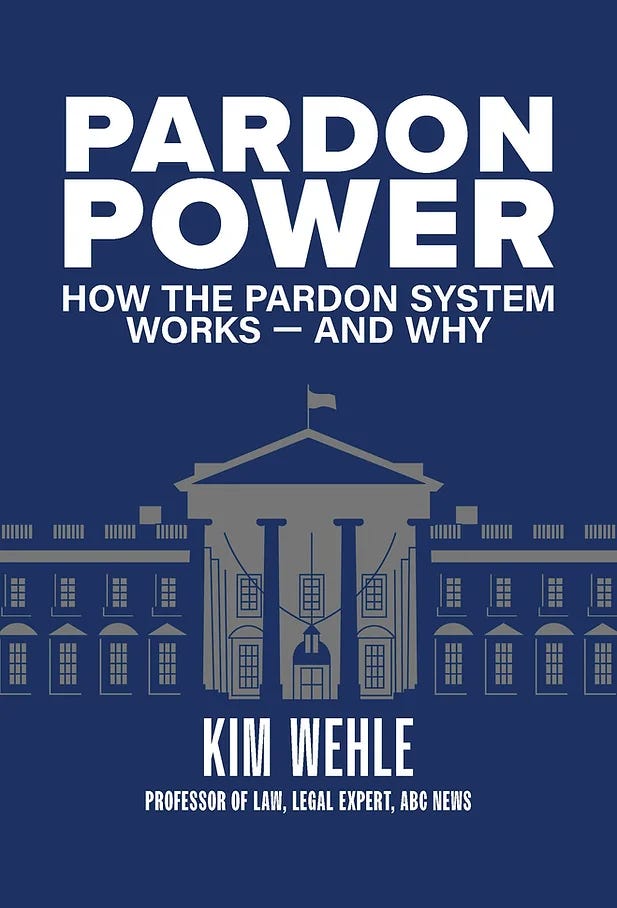DOGE has regained access to the Social Security Administration's data
In a mere three paragraphs, without full briefing or oral argument, the Supreme Court majority sided with Trump...again.
Last Friday, the Supreme Court reversed a temporary injunction from a judge in the U.S. District Court for the District of Maryland. The injunction prevented members of the Department of Government Efficiency (DOGE) from accessing unlimited amounts of data from the Social Security Administration. This data includes birth dates, addresses, Social Security numbers, driver’s license numbers, tax return information, bank account information, credit card numbers, employment and wage histories, citizenship and immigration records, and detailed medical records.
Of course, there is an entire group of federal laws in place to protect this type of data, but the Trump administration seems to care little about them. Meanwhile, DOGE itself is constituted dubious.
This newsletter unpacks the law in plain language. Please share it widely — and if you can, consider upgrading to paid.
I’m immensely grateful for your support!
This ruling from the Supreme Court—authored by none other than the Chief Justice himself—is extremely alarming. As I pointed out in my latest article for The Hill, the Supreme Court has been tasked with holding the other branches of government accountable to federal statutes since the 1803 landmark decision in Marbury v. Madison. Not only has the Supreme Court given up on holding other branches of government accountable to federal law, but it seems to have given up holding itself accountable as well.
A refresher on federal agencies:
Back in January, Trump issued an executive order and declared DOGE to be a new federal agency.
But the president cannot create federal agencies. That is a power reserved solely for Congress. Although the Constitution doesn’t mention federal agencies (except a reference to the Treasury Department), Congress establishes federal agencies under its Article I power to legislate.
Article II of the Constitution requires that the officers of these federal agencies (agency heads or “secretaries”) are appointed with the advice and consent of the Senate after the president has nominated them. This allows the elected representatives of the American people to gather information on the candidate’s qualifications and determine whether there is anything that would potentially disqualify them from the position. A major disqualifying factor would be conflicts of interest that might make it difficult—in some cases even impossible—for the officer to perform their duties neutrally.
Each agency is also subject to governing statutes that establish the roles and responsibilities of the officers. Officers are not permitted to act outside of their statutory obligations.
Congress did not create DOGE. And Elon Musk was appointed the head of the department without the advice and consent of the Senate. Had he gone for Senate confirmation, his clear conflicts of interest would have been exposed. Musk and his companies reportedly faced over $ 2.37 billion in legal liability as a result of 65 pending or potential federal investigations, regulations and litigation across 11 agencies related to businesses including Tesla, SpaceX, and Neuralink.
Instead following the constitutional process to make sure Musk’s conflicts of interest didn’t interfere with his official duties, White House Press Secretary Karoline Leavitt simply announced that should a conflict of interest arise, Musk would “excuse himself.” Clearly, that did not work.
He fired tens of thousands of employees—over a dozen of which were inspectors general (IGs). IGs expose fraud, waste, and abuse within federal agencies. They also audit agencies and report the results to Congress. No wonder why Musk wanted them gone.
He also messed around with agencies that regulate his businesses such as the Consumer Financial Protection Bureau (which is nearly extinct) and the National Highway Traffic Safety Administration.
How did this case get to the Supreme Court?
The executive order that created DOGE directed federal agencies to form “DOGE Teams” to “coordinate their work” with Musk and to “advise their respective Agency Heads on implementing the President’s DOGE Agenda.” The agencies are required to give DOGE teams “full and prompt access to all unclassified agency records, software systems, and IT systems.”
One of these agencies was the Social Security Administration (SSA), which houses loads of Americans’ private data. In February, about a month after DOGE took office and started to wreak havoc amongst federal agencies, the American Federation of State, County, and Municipal Employees filed a lawsuit in the U.S. District Court for the District of Maryland to challenge the access DOGE had to SSA data.
The lawsuit is based on the DOGE team’s alleged violations of numerous federal laws including the Privacy Act, the Administrative Procedure Act, the Social Security Act, the Tax Revenue Act of 1976, and the Federal Information Security Modernization Act of 2014. The Privacy Act, for example, protects citizens’ sensitive data unless government access is required “for a necessary and proper purpose” and mandates that “adequate safeguards” are established “to prevent misuses of this information.” This same information cannot be shared amongst agencies without the consent of the people whose personal data is compromised.
The plaintiffs asked the judge to issue a preliminary injunction, which is essentially a judicial order that mandates a person to either stop doing something or to take a specified action. In this instance, the plaintiffs asked the court to stop “DOGE’s access to SSA’s data systems.”
To be granted one, the court must find: (1) that the party has shown they are likely to win on the merits of the case, (2) that without an injunction there would be irreparable harm caused, (3) “the balance of equities tips” in the favor of the moving party, and (4) the injunction would be in the broader public interest.
U.S. District Judge Ellen Lipton Hollander found that all four parts of the preliminary injunction analysis were met and granted the motion. As part of the order, Judge Hollander required that the government “delete all non-anonymized PII” (personally identifiable information) “data in their possession or under their control” that came from the SSA.
The government appealed the decision to the Court of Appeals for the Fourth Circuit, which decided 9-6, to uphold Judge Hollander’s preliminary injunction. The government then went to the Supreme Court and asked them to stay the injunction, which basically means put it on hold while the issue is adjudicated.
What did the Court say and why?
It’s important to note that orders issued by district courts are typically upheld while the case is pending appeal unless there is what amounts a finding of exceptional circumstances.
Here, DOGE could get what it wanted down the line from either the Court of Appeals for the Fourth Circuit or the Supreme Court. And while that case was pending on appeal, the historical and legal precedent of statutory protections for Americans would be enforced.
But that’s not what the majority decided.
Rather, Chief Justice Roberts wrote in the majority opinion that it was DOGE—not the American people—who would face irreparable harm if the injunction held while the appeal was pending.
The four-part test that Roberts was required to consider involved: (1) a showing that the government was likely to win despite the various federal laws that otherwise protect the data, (2) without a stay to halt Judge Hollander’s order, there would be irreparable damage, (3) that the stay would not “substantially injure” the Americans who want their personal data to remain secure, and (4) that the stay is in the broader public interest.
Many of you, like myself, are probably wondering how Roberts concluded that all four of those showings were made. We will have to keep wondering. Because Roberts didn’t actually analyze any of those factors; instead, he merely summarily ruled they were met.
The Chief Justice of the Supreme Court found that it is DOGE, an unconstitutionally established federal agency, that was at a greater risk of harm if it lost access to the secure and protected data at the SSA while Trump appeals than the American people whose data is at risk of breach. He reasoned that the DOGE team needs access to the records “for those members to do their work.” It still unclear exactly what work that is other than unlawfully causing complete chaos.
In a dissenting opinion, Justice Ketanji Brown Jackson (joined by Justice Sonia Sotomayor) wrote that “the ‘urgency’ underlying the government’s stay application is the mere fact that it cannot be bothered to wait for the litigation process to play out before proceed as it wishes.” But, the majority nonetheless is “jettisoning careful judicial decision-making and creating grave privacy risks for millions of Americans in the process.”
What’s the takeaway?
Even if the district court is affirmed on appeal, the American people will already have suffered irreparable harm because the data will already have been breached and there is no possible remedy for it.
This is a massive loss for the American people and another blow to the rule of law.
Follow the facts,
KW
My latest book is Pardon Power: How the Pardon System Works—and Why.
Click the link below to access my Linktree, which contains links to all my articles and books. Also, check out my #SimplePolitics YouTube channel!






Another nonsensical decision from Roberts that will hurt millions of regular Americans
We now know that Trump's strategy to push all cases to SCOTUS is destined for success. That body, like Trump, will be known in the history books (if they're allowed to be written) as major
players in the deconstruction of the country that was America. I hold them in contempt exceeded only by Trump and his team of autocratic haters.